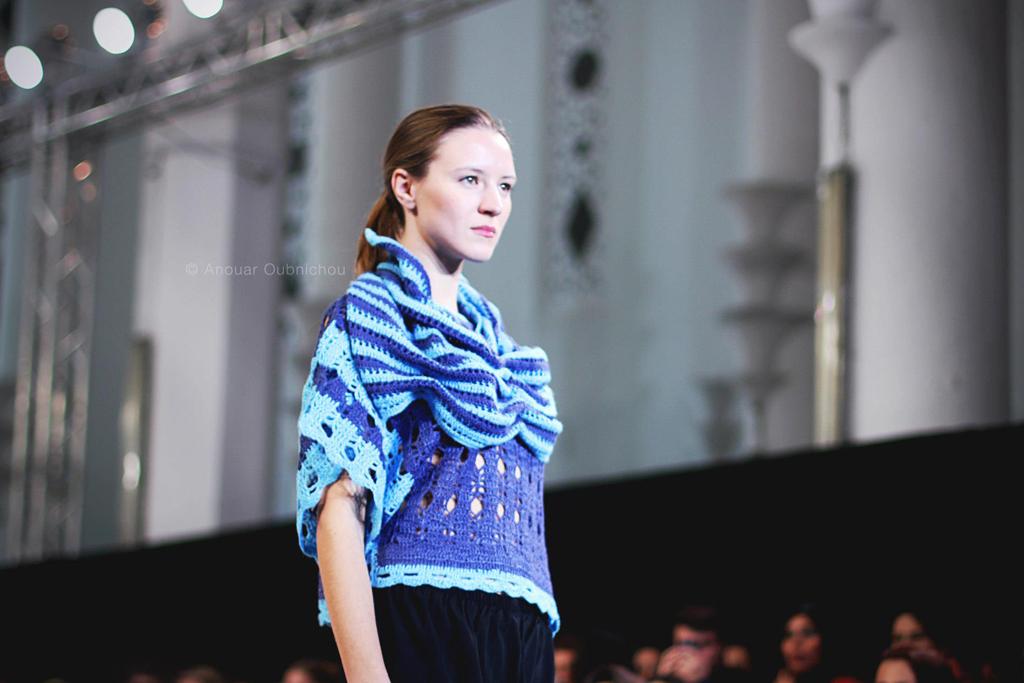Moroccan style, old and new: 3 Questions with Ghitta Laskrouif
“Young people here are more ambitious. We are trying our best to help each other and show our potential someday things will work on the right way. We need time and patience but we will achieve our dreams,” says Laskrouif on the future of young designers from Morocco.
Ghitta Laskrouif is a young fasion designer from Casablanca. Her style is contemporary, shifting away from traditional Moroccan items like the caftan and experimenting with novel materials. Her focus is on slow fashion which contrasts the fast fashion seen in Morocco's retail stores. Laskrouif emphasizes intricate handmade crochet and embroidery to reflect, in spite of the antique methods, a "modern vision of Morocco."
Managing a small business, raising funds to start projects and gaining exposure are challenges that many young designers face. While the challenges of succeeding seem daunting Laskrouif thinks that in the end, her work will flourish.
"Young people here are more ambitious. We are trying our best to help each other. Some day things will work out the right way. We need time and patience but we will achieve our dreams."
![]()
Moroccan designer Ghitta Laskrouif. (Courtesy photo)
Here, Laskrouif answers three questions about her work.
How did you get involved with fashion?
My family is skilled in artisanal things [knitting, embroidery] and it influenced me to start in fashion. I learned it all when I was little.
I also studied fashion and just learned the basics of contemporary design at school for two years. After my studies in fine arts I had a chance meeting [with] the founder of [Casablanca] Fashion Week, the first contemporary fashion event here. He was preparing for the first edition of Fashion Week at that time. He loved my work and advised me to participate in the next one and that's what I did. I presented my portfolio and the jury accepted it.
What do you think is your personal contribution to fashion in Morocco?
My work is about handmade and ethical designs. It's ethical because I practice upcycling and counter fast and cheap fashion with handmade, quality products. Upcycling means giving a product more quality than the original. It's not just recycling, reusing a material. [By] handmade, I mean crochet knitting, embroideries and mini products. I don't do a lot of the same product, it makes the artisans at ease and they are happy to make it.
I’m trying to influence people here and to encourage local products through my fashion work and photography. People here are so into international labels and fast fashion. I think it doesn't help develop our economy. I’m not going to influence a lot but I am trying my best to do work that engages us and unites us here with artisans and customers.
What challenges have you faced as a designer in Morocco?
Buying from a designer is something new in Morocco. Most people are more excited to buy clothes when it's from a big store or a foreigner label so no one really buys them [designs]. We need a fashion culture too, magazines that presents Moroccan designers. I’ve been contacted from foreigner magazines but never from the Moroccan ones.
We also don't have a place to exhibit [our designs]. The fashion week this year is cancelled because there are no sponsors. People who have money don't invest on artistic projects. Designers they have to do everything: produce and make his own event or workshop if he want to sell. Otherwise it's hard to continue on producing. Now it's a little better with some pop up stores and concept stores. People [have] started to understand and have some interest in designers clothes.
Editor's note: Portions of this interview were edited and condensed for clarity.
We want to hear your feedback so we can keep improving our website, theworld.org. Please fill out this quick survey and let us know your thoughts (your answers will be anonymous). Thanks for your time!
